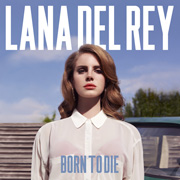Lana Del Rey’s debut in the music world was considerably less than smooth.�It may have been the roughest landing in musical history.
Even with the bumpy arrival that was Del Rey’s performance on Saturday Night Live supporting the release of her album, “Born to Die,” the Del Rey plane made it safely to the gate. The dark and emotional album, although disregarded by publications like Rolling Stone and Entertainment Weekly, caught my attention as an honest portrayal of a rock opera love story.

This edition of Music Buff from Avalon Jacka features Lana Del Rey's "Born to Die." (Courtesy Universal Music)
After seeing Del Rey’s botched performance on SNL on January 14, I was concerned for the music industry. Critics across the Internet attacked her shaky vocal performance and her distant attitude. While watching, I found myself questioning whether major labels were handing out recording contracts to everyone and their tone-deaf sister who walked through the door.
To be fair to Del Rey, she is one of two singers in the entire history of SNL to perform on the show before their debut albums had dropped. That’s a lot of pressure for a new artist. In an article in The Hollywood Reporter, Del Rey admitted that she didn’t feel comfortable on stage, which explains her awkward performance.
“I’m nervous. I’m not a natural performer or exhibitionist,” she said. “When I was younger, I hated the focus, and it made me feel strange.”
Even with the flak she received for her bumbling rendition of her singles “Blue Jeans,” and “Video Games,” Del Rey managed a successful premiere. Honestly, the SNL controversy may have made her career. “Born to Die,” debuted at No. 2 on the Billboard 200 Albums chart on January 31. Once I listened, I could understand why. It took five full listenings, but I got there.
Del Rey’s style is not consistent from song to song, or even from verse to chorus. This attention-deficit-disorder-style album was disorienting for me at first. For two weeks, I walked around listening to “Born to Die”, wondering whether I actually liked the album, or if Del Rey was just a confused girl who couldn’t focus for long enough to write a song in a consistent genre. Then, it finally clicked for me.
“Born to Die” brings something to the music scene that hasn’t been around for years. Many people who can’t decide on their favorite genre of music often describe their musical tastes as “eclectic.” Well, Del Rey’s music is the perfect definition of this; she is the first truly eclectic major-label artist that I have heard in recent years. Throughout “Born to Die,” Del Rey manages to encompass multiple genres, switching from blues to pop to hip-hop to jazz.
Somehow, she even does this in the middle of songs, but the transitions are effortless. In “Off to the Races,” Del Rey mixes three very different songs into one five-minute masterpiece.� The verses are blues-y and sultry, and her choruses are poppy with a Betty Boop-ish intonation. The bridges connecting these are dark and dissonant, but the gap is crossed fluidly.
The overall theme of “Born to Die” is comprised of all the aspects of a romantic relationship: love, lust, sex and heartbreak. There seems to be a storyline, albeit a vague one, throughout the album. Del Rey gives an honest female perspective on her love life that most female pop stars aren’t able to give, because they usually don’t write their own music. With that in mind, Del Rey comes off as an empowered women rather than easy when she refers to herself as, “your little scarlet harlot.”� She wants that label; heck, she’s even proud of it. Other lust-filled tracks include “National Anthem,” where Del Rey compares herself to America’s national anthem; and “Carmen,” about a teen street walker.
Don’t be fooled by Del Rey coming out of the gate with her sexual references swinging. The are plenty of songs that cover the romantic side of Del Rey’s love life. “Blue Jeans” adds contrast to the overt sexual overtones of “Off to the Races,” as do the songs “Video Games,” “Radio,” “Diet Mountain Dew,” and the title track. Del Rey wraps up the set list with songs about heartbreak, including “Million Dollar Man” and “Summertime Sadness.”
“Born to Die” may take several playings for a listener to appreciate the album, and maybe more plays to actually enjoy it. But if you give her a chance, Del Rey will show you that she has what it takes to be the next big pop star.
Contact CU Independent Entertainment Editor Avalon Jacka at�Avalon.jacka@colorado.edu.
